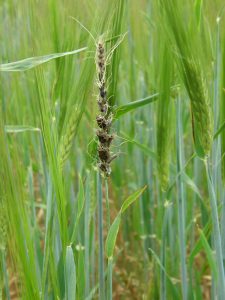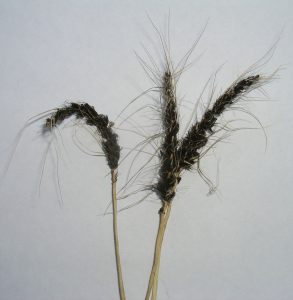Bulletin #1016, Loose Smut of Barley and Oats
Bulletin #1016, Loose Smut of Barley and Oats (PDF)
By Steven B. Johnson, Extension crops specialist, University of Maine
For information about UMaine Extension programs and resources, visit extension.umaine.edu.
Find more of our publications and books at extension.umaine.edu/publications/.
Loose smut of barley is caused by the fungus Ustilago nuda and occurs virtually everywhere barley is grown. Loose smut of oats is caused by the related pathogen Ustilago avenae and occurs virtually everywhere oats are grown. Other species of Ustilago attack wheat, corn, and other grasses. Infected seed kernels are converted into black spores that are visible on the seed heads, giving the disease the common name of loose smut. The pathogen is transmitted through infected seeds. Loose smut can be one of the most destructive diseases of barley and oats. While the use of seed treatments containing a fungicide has made the disease manageable, loose smut is still present and a threat. The disease has a higher prevalence where seed treatments are not used and can be rather conspicuous in the field. As the seed is replaced by the fungus, yield loss is proportional to the percentage of smutted heads.
Biology
The loose smut fungus is seed-borne and survives from season to season within the embryo of the seed. As the seed germinates, the loose smut fungus activates and infects the developing seedling, where it continues to grow within the plant until flowers start to form. At that time, the loose smut fungus replaces the seed with black powdery spores. Heads of small grains infected with the loose smut pathogen—in which the grain has been completely replaced by the smut fungus— generally emerge shortly before healthy heads. New infections occur only during flowering and are favored by cool (60°F to 70°F), wet weather. Spores of the loose smut fungus are wind-blown and travel to flowering heads of healthy plants, where they germinate and invade the female parts of the barley flowers, colonizing the embryo. After heading occurs, seed remaining in heads that are not totally black can be infected and carry the pathogen into the next disease cycle. The pathogen goes dormant when the infected seed matures. Infected seed appears normal and cannot be separated out. This seed serves as inoculum when planted.
Symptoms
Before heading, infected plants do not appear different from healthy plants. Loose smut symptoms (actually signs of the pathogen) appear as the diseased heads appear. The seed kernels are replaced with masses of black, powdery spores held in by a thin membrane that is easily ruptured, dispersing the spores. At harvest, only the rachises of the flower clusters may be visible on infected heads from which all the spores have dispersed.
Management
- Use certified seed, as infected seed is the source of inoculum.
- Ensure that all seed to be planted has been treated with a recommended systemic material registered for control of loose smut.
Thanks to reviewer David Fuller, Extension Professional
Information in this publication is provided purely for educational purposes. No responsibility is assumed for any problems associated with the use of products or services mentioned. No endorsement of products or companies is intended, nor is criticism of unnamed products or companies implied.
© 2014, reviewed 2020
Call 800.287.0274 (in Maine), or 207.581.3188, for information on publications and program offerings from University of Maine Cooperative Extension, or visit extension.umaine.edu.
In complying with the letter and spirit of applicable laws and pursuing its own goals of diversity, the University of Maine System does not discriminate on the grounds of race, color, religion, sex, sexual orientation, transgender status, gender, gender identity or expression, ethnicity, national origin, citizenship status, familial status, ancestry, age, disability physical or mental, genetic information, or veterans or military status in employment, education, and all other programs and activities. The University provides reasonable accommodations to qualified individuals with disabilities upon request. The following person has been designated to handle inquiries regarding non-discrimination policies: Director of Institutional Equity and Title IX Services, 5713 Chadbourne Hall, Room 412, University of Maine, Orono, ME 04469-5713, 207.581.1226, TTY 711 (Maine Relay System).



